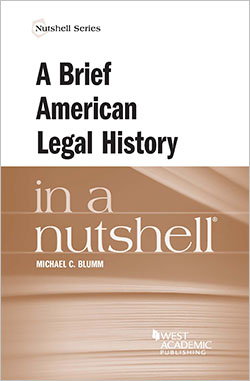- Home
- A Brief American Legal History in a Nutshell
A Brief American Legal History in a Nutshell
A Brief American Legal History is an accessible survey of the law throughout American history, written for lawyers and law students without an historical background as well as for those interested in American history without law school training.
The book begins with the English influence on American law, then considers how law affected the split between two countries; how slavery was a bedrock economic principle by the revolutionary era; how lawyers influenced the Constitution; how the law accommodated the transportation revolution of the early 19th century; and how it failed to avoid—and perhaps exacerbated—the sectional conflict that led to the Civil War.
The book proceeds to explain how the Supreme Court enfeebled the Civil War constitutional amendments and ratified post-Reconstruction “Jim Crow” laws maintaining racial segregation not only of Blacks but also Asians. Also examined is how the conservative Court and invoked constitutional law to challenge efforts to enact wage and hour labor legislation and ratified the “special status” of women while denying them the right to vote, hold office, or enter professions. One of the features of the book is that it surveys common law developments throughout American history.
In the 20th century, the Court stopped vetoing socio-economic legislation, and the political process revolutionized labor law during the New Deal. In the 1960s, the Warren Court not only held state segregation unconstitutional, it bolstered rights to a free press, and established individual liberties in privacy, criminal procedure, and the right to vote. From the 1970s until into the 21st century, courts generally upheld the environmental law revolution, although the Roberts Court has recently erected what may be substantial obstacles, recalling the Court’s impediments to labor legislation in an earlier century.
The 21st century conservative Court constitutionalized unlimited campaign contributions, recognized individual gun possession, crippled voting rights legislation, erected new protections for religious liberty, and allowed partisan gerrymandering, to say nothing of stopping a recount in the presidential vote, thereby in effect appointing a president. And, of course, the Court’s new supermajority’s bombshell was its overruling of the right to abortion in 2022. The Court’s new reliance on a “shadow docket” has allowed it to intervene in a variety of controversies without issuing opinions, drawing criticism as a threat to democratic decisionmaking. The intersection of law and politics, a theme throughout the book, has never been more apparent.
Imprint: West Academic Publishing
Series: Nutshells
Publication Date: 06/28/2023
Michael C. Blumm, Lewis & Clark Law School
CasebookPlus™
This title is available in our CasebookPlus format. CasebookPlus provides support beyond your classroom lectures and materials by offering additional digital resources to you and your students. Anchored by faculty-authored formative self-assessments keyed to our most popular casebooks, CasebookPlus allows students to test their understanding of core concepts as they are learning them in class – on their own, outside of the classroom, with no extra work on your part. CasebookPlus combines three important elements:
- A new print or digital casebook
- Access to a downloadable eBook with the ability to highlight and add notes
- 12-month access to a digital Learning Library complete with:
- Chapter questions keyed to the casebook
- Black Letter Law questions (available in select subjects)
- Subject area review questions for end of semester use
Leading digital study aids, an outline starter, and audio lectures in select subjects
Students can still utilize CasebookPlus digital resources if they’ve purchased a used book or are renting their text by purchasing the Learning Library at westacademic.com.
With CasebookPlus, you can customize your students’ learning experience and monitor their performance. The quiz editor allows you to create your own custom quiz set, suppress specific quiz questions or quiz sets, and time-release quiz questions. Additionally, the flexible, customized reporting capability helps you evaluate your students’ understanding of the material and can also help your school demonstrate compliance with the new ABA Assessment and Learning Outcomes standards.
Learn more about this series.
Access Denied
Law School Faculty - Sign in or Create an Account to access this content. Law faculty who have created an account can sign in after receiving email notification that registration has been approved. Email accountmanager@westacademic.com or call 800-313-9378 for assistance.
Other Higher Education Faculty who wish to access digital review copies or teaching resources should contact their West Academic Account Manager at college@westacademic.com or 800-360-9378.
Adopters Only
This content is intended for adopters only. Sign in or Create an Account to access this content. Law faculty who have created an account can sign in after receiving email notification that registration has been approved. If you are an adopter who is unable to access this content after signing in, contact your account manager for assistance at accountmanager@westacademic.com or call 800-313-9378 for assistance.
Access Denied
Sign in or Create an Account to access this content. Faculty who have created an account can sign in after receiving email notification that registration has been approved. Contact us for assistance.
Law School Faculty: email accountmanager@westacademic.com or call 800-313-9378.
Other Higher Education Faculty: email college@westacademic.com or 800-360-9378.
Access Denied
Higher education faculty who wish to view this document should contact their West Academic Account Manager at college@westacademic.com or 800-360-9378.
